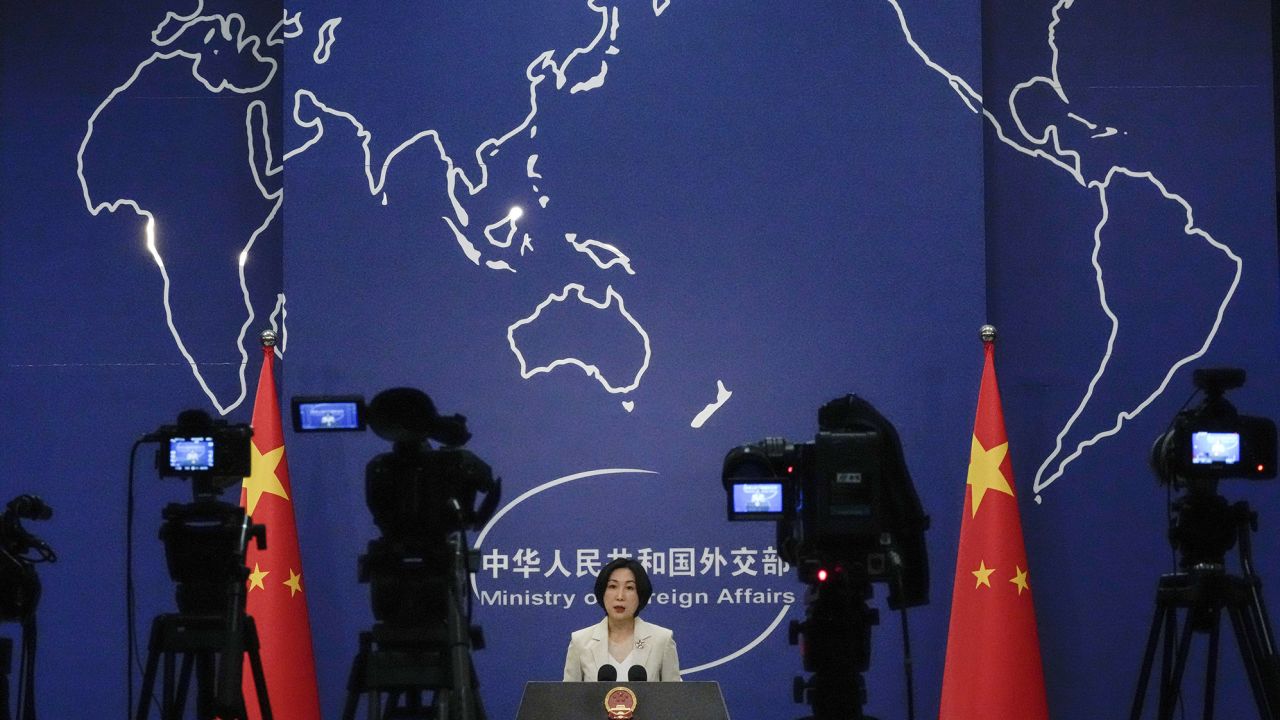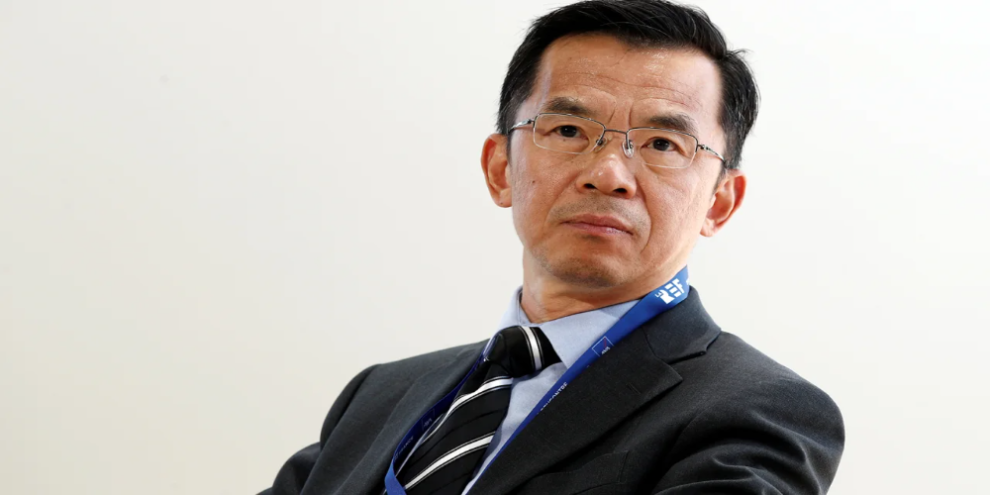Hong KongCNN — European countries are demanding answers from Beijing after its top diplomat in Paris questioned the sovereignty of former Soviet republics, in comments that could undermine China’s efforts to be seen as a potential mediator between Russia and Ukraine.
The remarks by China’s ambassador to France Lu Shaye, who said during a television interview that former Soviet countries don’t have “effective status in international law,” have caused diplomatic consternation, especially in the Baltic states.
Lithuania, Latvia, Estonia would be summoning Chinese representatives to ask for clarification, Lithuanian Foreign Minister Gabrielius Landsbergis confirmed on Monday.
Officials including from Ukraine, Moldova, France and the European Union also all hit back with criticisms of Lu’s comments.
Lu made the remarks in response to a question whether Crimea, which was illegally annexed by Russia in 2014, was part of Ukraine.
“Even these ex-Soviet countries don’t have an effective status in international law because there was no international agreement to materialize their status as sovereign countries,” Lu said, after first noting that the question of Crimea “depends on how the problem is perceived” as the region was “at the beginning Russian” and then “offered to Ukraine during the Soviet era.”
The remarks appeared to disavow the sovereignty of countries that became independent states and United Nations members after the fall of the Soviet Union in 1991 – and come amid Russia’s brutal invasion of Ukraine under leader Vladimir Putin’s vision the country should be part of Russia.
The Chinese embassy in France said later that Lu’s comments were “not a statement of policy, but an expression of personal views.”
“On territorial sovereignty, the Chinese side’s position is constant and clear. The Chinese side respects the sovereignty, independence and territorial integrity of all countries and upholds the purposes and principles of the UN Charter,” the embassy said in a statement on Monday.
“Following the dissolution of the Soviet Union, China was one of the first countries to establish diplomatic relations with the countries concerned. And China has always worked to develop bilateral friendship and cooperation with them according to the principles of mutual respect and equality. The Chinese side respects the status of the republics born after the dissolution of the Soviet Union as sovereign countries,” it added.
Beijing has so far refused to condemn Russia’s invasion of Ukraine or call for a withdrawal of its troops, instead urging restraint by “all parties” and accusing NATO of fueling the conflict. It has also continued to deepen diplomatic and economic ties with Moscow.
The statement from the Chinese embassy in France continued: “On the issue of Ukraine, China’s position is constant and clear. It is ready to continue working with the international community to make its own contribution to the political settlement of the Ukrainian crisis.”
‘We Expect China to Explain its Position Unequivocally’
Meanwhile, EU foreign affairs chief Josep Borrell said that China will be discussed during a foreign ministers meeting on Monday.
“We have been talking a lot about China (over) the last days, but we will have to continue discussing about China because it’s one of the most important issues for our foreign policy,” Borrell said.
The EU foreign ministers will also raise the situation in Moldova and Georgia, as those countries “see the war (in Ukraine) very close, they feel the threat,” he added.
Moldova is a small country on Ukraine’s southwestern border that has been caught in the crossfire of Russia’s invasion.
Georgia, which shares a frontier with Russia further east, has also come under the spotlight, after protests erupted over a controversial foreign agents bill similar to one adopted in the Kremlin to crack down on political dissent.
“For us Georgia is a very important country and remember that it has specific security issues because its territory is partially occupied by Russia,” Borrell said.
On Sunday, he tweeted that the remarks by the Chinese ambassador were “unacceptable” and “the EU can only suppose these declarations do not represent China’s official policy.”

Chinese Foreign Ministry spokesperson Mao Ning, pictured on April 24, when she said that China respects the “sovereign state status” of former Soviet Union countries.Andy Wong/AP
France also responded Sunday, with its Foreign Ministry stating its “full solidarity” with all the allied countries affected and calling on China to clarify whether these comments reflect its position, according to Reuters.
Germany said it expects China to explain its stance on the sovereignty of former Soviet states, saying it has “taken note of the Chinese ambassador’s statement on French television with great astonishment, especially since the statements are not in line with the Chinese position known to us so far.”
“Of course we expect China to explain its position unequivocally,” German Foreign Office spokesman Christian Wagner said on Monday.
As the Russian Federation and the other states that emerged from the dissolution of the Soviet Union have recognized each other as sovereign states within their existing borders, “the sovereignty and territorial integrity of these states is inviolable,” Wagner added.
Several leaders in former Soviet states, including Ukraine, were quick to hit back following the interview, which aired Friday on French station LCI.
Latvian Foreign Minister Edgars Rinkevics called for an “explanation from the Chinese side and complete retraction of this statement” in a post on Twitter Saturday.
He pledged to raise the issue during a meeting of EU foreign ministers Monday, where relations with China are expected to be discussed.
“We are surprised about Chinese (ambassador’s) statements questioning sovereignty of countries declaring independence in ’91. Mutual respect & (territorial) integrity have been key to Moldova-China ties,” the Moldovan ministry said on its official Twitter account.
“Our expectations are that these declarations do not represent China’s official policy.”
“It is strange to hear an absurd version of the ‘history of Crimea’ from a representative of a country that is scrupulous about its thousand-year history,” Mykhailo Podolyak, an adviser to Ukraine’s Presidential Administration, also wrote on Twitter.
“If you want to be a major political player, do not parrot the propaganda of Russian outsiders,” he added.
China’s European Ties
This is not the first time that Lu – a prominent voice among China’s so-called aggressive “wolf-warrior” diplomats – has sparked controversy for his views.
“He’s been a well-known provocateur,” said Jean-Pierre Cabestan, a professor of political science at Hong Kong Baptist University.
“But he’s a diplomat, he represents his government, so it reflects some thinking within China about the issue,” he said. adding, however, that it’s “not the time for China to put at risk its relationship” with France.
The comments place Beijing under the spotlight at a particularly sensitive moment for its European diplomacy.
Ties have soured as Europe has uneasily watched China’s tightening relationship with Russia and its refusal to condemn Putin’s invasion.
Beijing in recent months has sought to mend its image, highlighting its stated neutrality in the conflict and desire to play a “constructive role” in dialogue and negotiation, further fueling debate in European capitals over how to calibrate its relationship with China, a key economic partner.
That debate intensified this month following a visit to Beijing from French President Emmanuel Macron, who signed a raft of cooperation agreements with China during a trip he framed as an opportunity to start work with Beijing to push for peace in Ukraine.
Voices in former Soviet states, where many remember being under Communist authoritarian rule, have been among those in Europe critical of such an approach.
“If anyone is still wondering why the Baltic States don’t trust China to ‘broker peace in Ukraine,’ here’s a Chinese ambassador arguing that Crimea is Russian and our countries’ borders have no legal basis,” Lithuanian Foreign Minister Landsbergis wrote on Twitter Saturday following Lu’s interview.
Moritz Rudolf, a fellow and research scholar at the Paul Tsai China Center of the Yale Law School in the US, said China had been “increasingly successful in being perceived as a responsible power that might play a constructive role in a peace process in Ukraine.”
“It remains to be seen whether the leadership in Beijing realizes how damaging those words may turn out to be for its ambitions in Europe if the Foreign Ministry does not distance the (People’s Republic of China) from the words of Ambassador Lu,” he said.
He added that China’s “official position and practice” contradict Lu’s comments, including as China had not recognized the sovereignty of Russia over Crimea or any territory it annexed since 2014.
Others suggested Lu’s remarks may also shed light on Beijing’s real diplomatic priorities.
For Russia, giving up control of Crimea is widely seen as a non-starter in any potential peace settlement on Ukraine. This means Beijing may have a hard time giving a straight answer on this question, according to Yun Sun, director of the China Program at the Washington-based think tank Stimson Center.
“The question is impossible to answer for China. China’s relationship with Russia is where its influence comes from,” she said, adding that didn’t mean Lu could have given a “better answer.”
“Between sabotaging China’s relationship with Russia and angering Europe, (Lu) chose the latter.”
Source : CNN















